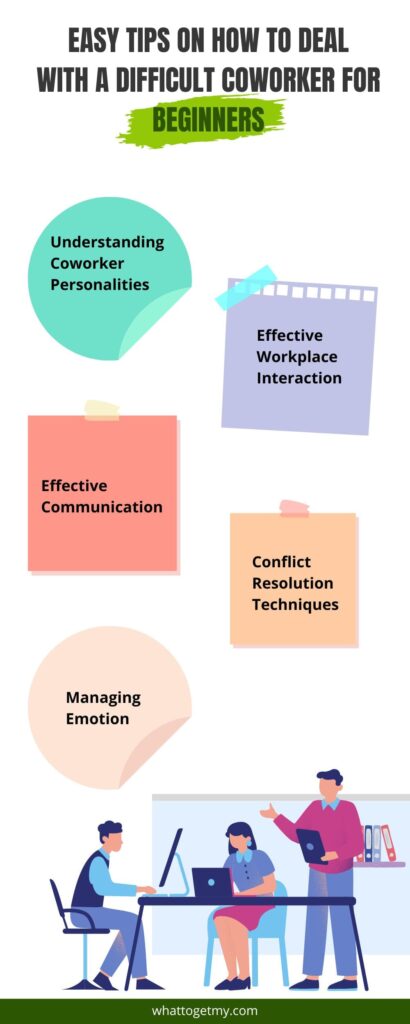5 Easy Tips on How to Deal with a Difficult Coworker For Beginners (2023)
-
Dealing with a difficult coworker can be a challenging experience that affects your overall work environment and personal well-being.
-
Establishing clear boundaries is vital when dealing with difficult coworkers. By communicating your limits and expectations, you assert yourself and maintain self-respect.
-
Remember, setting boundaries is not about being rude or creating unnecessary conflicts.
-
You can create an environment that fosters understanding, collaboration, and conflict resolution by employing effective communication strategies.
Open and honest communication, and active listening, can foster understanding and collaboration, diffusing conflicts with difficult coworkers.
Dealing with a difficult coworker can be a challenging experience that affects your overall work environment and personal well-being. However, by understanding effective strategies for dealing with difficult coworkers, from setting boundaries to enhancing communication skills, you can confidently navigate these situations and promote workplace harmony. In this article, we will explore various techniques to deal with difficult coworkers, managing toxic relationships with coworkers, and navigating challenging coworker dynamics, to create a positive work environment and maintain your professional growth.
I. Understanding Difficult Coworker Personalities
It is crucial to understand the types of difficult coworker personalities. They can display aggression, passive-aggressiveness, constant negativity, and micromanagement. Recognizing these characteristics will enable you to assess the situation and develop appropriate coping mechanisms. Understanding their behavior can help you respond effectively and minimize conflict in the workplace.
When dealing with difficult personalities at work, it is essential to recognize the unique traits and behaviors that make a coworker challenging to interact with. An aggressive coworker may exhibit assertive and dominating behavior, often seeking control through aggressive interactions. On the other hand, a passive-aggressive coworker may display indirect resistance or subtle forms of sabotage. Constantly negative coworkers can bring down the entire team’s morale with their pessimistic outlook, while micromanagers tend to excessively control and scrutinize every aspect of their colleagues’ work.
By identifying these difficult personality traits at work, you can gain valuable insights into your coworkers’ motivations and behavior patterns. Armed with this understanding, you can proactively develop strategies to navigate interactions with them more effectively. For instance, when dealing with an aggressive coworker, it is essential to maintain a calm and assertive demeanor, refusing to engage in power struggles. Establishing and enforcing boundaries can be effective when dealing with passive-aggressive coworkers, as it helps to mitigate their indirect tactics. When faced with constant negativity, it is crucial to maintain a positive mindset and not allow negativity to affect your outlook. Lastly, when dealing with micromanagers, seeking regular clarification on expectations and providing timely updates can help establish trust and autonomy in the working relationship.
Understanding and recognizing these difficult personalities at work empowers you to respond strategically rather than emotionally, minimizing the potential for conflicts and creating a more harmonious work environment. It is essential to approach these situations with empathy and practical communication skills, fostering better relationships even with challenging coworkers. By navigating the dynamics of dealing with difficult personalities at work, you can promote a healthier and more productive workplace environment for yourself and your colleagues.

II. Setting Boundaries for Effective Workplace Interactions
Establishing clear boundaries is vital when dealing with difficult coworkers. By communicating your limits and expectations, you assert yourself and maintain self-respect. Set boundaries that define what you will and will not tolerate in your interactions. Be consistent in enforcing these boundaries to ensure they are respected. This approach helps create a professional environment and prevents difficult coworkers from encroaching on your personal space.
Setting Boundaries for Effective Workplace Interactions
When handling difficult coworkers, it is crucial to establish clear boundaries to maintain a healthy and productive work environment. By setting boundaries, you assert yourself, communicate your limits, and maintain self-respect. These boundaries define what you will and will not tolerate in your interactions with colleagues, allowing you to protect your well-being and maintain control.
To effectively set boundaries with difficult coworkers, consider the following tips:
1. Communicate assertively: Clearly and directly communicate your expectations and limits to your coworkers. Use “I” statements to express how their behavior affects you and what you need from them. For example, say, “I feel overwhelmed when you constantly interrupt me during meetings. I would appreciate your letting me finish my thoughts before interjecting.”
2. Be consistent: Enforce your boundaries consistently. Consistency means not wavering or compromising on what you have established. When you consistently uphold your boundaries, difficult coworkers will understand that you are serious about your limits and unwilling to be pushed beyond them.
3. Choose your battles: Not every situation requires confrontation. Pick your battles wisely and prioritize the boundaries that are most important to you. Sometimes, letting minor issues slide may be more beneficial rather than engaging in unnecessary conflicts.
4. Document incidents: Record specific incidents where your boundaries were crossed or violated. This documentation can be helpful if you need to address the issue with your supervisor or HR department. It provides evidence of a pattern of behavior and can support your case for intervention or resolution.
5. Seek support: Contact trusted colleagues, mentors, or supervisors who can offer guidance and support when dealing with difficult coworkers. Share your experiences and seek advice on navigating challenging situations while maintaining boundaries.
Remember, setting boundaries is not about being rude or creating unnecessary conflicts. It is about establishing a respectful and professional working environment. By clearly defining your limits, you communicate your expectations and needs, ensuring that your interactions with difficult coworkers remain within acceptable boundaries. This approach promotes a healthier work dynamic and protects your well-being while contributing to a more positive and productive workplace.
The graph above on workplace conflict statistics for 2023 shows the impact of conflict at work, according to polling by Gitnux. To create a culture of support, employers must foster effective communication and connection with their employees. According to an Achievers’ Report, 52% of employees say they stay in a job because they feel valued and supported.
III. Effective Communication Strategies for Difficult Coworkers
Effective communication plays a pivotal role in managing difficult coworker relationships. Utilize powerful communication techniques to express your thoughts and feelings while respecting yourself and the other person. Practice active listening and avoid engaging in aggressive or manipulative exchanges. Open and honest communication and active listening can foster understanding and collaboration, potentially diffusing conflicts with difficult coworkers.
Effective Communication Strategies for Difficult Coworkers
In coping with difficult colleagues: a guide, effective communication is essential for managing relationships in the workplace. Using assertive communication techniques allows you to express your thoughts and feelings while respecting yourself and others. By practicing active listening and avoiding aggressive or manipulative exchanges, you can create an atmosphere of understanding and collaboration, potentially diffusing conflicts with difficult coworkers.
Here are some effective communication strategies to employ when dealing with difficult colleagues:
1. Be assertive: Clearly and confidently express your thoughts, concerns, and boundaries. Use “I” statements to communicate how their behavior affects you. For example, say, “I feel overwhelmed when you consistently delegate tasks to me without discussing them first. I would appreciate it if we could collaborate on dividing the workload.”
2. Practice active listening: Give your full attention to your coworker when they speak. Focus on understanding their perspective rather than formulating your response. Paraphrase their points to ensure you have grasped their message accurately. This demonstrates respect and promotes constructive dialogue.
3. Avoid confrontations: It’s essential to remain calm and composed when dealing with difficult colleagues. Refrain from engaging in aggressive or heated exchanges that can escalate the situation. Instead, take a step back, breathe, and respond thoughtfully rather than reactively.
4. Choose the right timing: Pick an appropriate time and place for discussions with difficult colleagues. Find a quiet, private space where both parties feel comfortable and focused. Avoid addressing sensitive issues amid a busy workday or during tense moments.
5. Seek common ground: Look for areas of agreement or shared goals with your difficult colleague. Common ground can help bridge the gap and facilitate more positive interactions. Focus on collaboration and problem-solving rather than dwelling on differences.
You can create an environment that fosters understanding, collaboration, and conflict resolution by employing effective communication strategies. While dealing with difficult colleagues can be challenging, maintaining open and honest communication can help build bridges and improve working relationships. Remember, effective communication is a two-way process, so be receptive to feedback and be willing to find standard solutions.
IV. Conflict Resolution Techniques in the Workplace
Conflicts with difficult coworkers can arise, but they don’t have to escalate. Implementing conflict resolution techniques can help resolve disagreements and foster a positive working relationship. Explore strategies such as active problem-solving, seeking common ground, and practicing empathy. Additionally, involving a mediator or supervisor can facilitate constructive discussions and find mutually agreeable solutions.
Conflict Resolution Techniques in the Workplace
In the face of workplace challenges, building resilience is vital. Conflicts with difficult coworkers can arise, but they don’t have to escalate. You can effectively resolve disagreements and foster a positive working relationship by implementing conflict resolution techniques. These techniques help create a harmonious work environment and promote collaboration and understanding among colleagues.
Consider the following conflict resolution strategies when dealing with difficult coworkers:
1. Active problem-solving: Find solutions instead of focusing on blame or personal attacks. Engage in active problem-solving by identifying the underlying issues and working together to find mutually beneficial resolutions. This approach promotes teamwork and allows for addressing root causes rather than surface-level conflicts.
2. Seek common ground: Look for areas of agreement or shared interests with your difficult coworker. Finding common ground can help build rapport and create a foundation for resolving conflicts. Emphasize shared goals and the greater good of the team or organization to encourage cooperation and compromise.
3. Practice empathy: Understand your difficult coworker’s perspective and motivations. Put yourself in their shoes and consider their point of view. Cultivating empathy allows you to approach conflicts with compassion and openness, fostering better communication and understanding.
4. Involve a mediator or supervisor: If the conflict persists or proves challenging to resolve independently, consider involving a neutral third party. A mediator or supervisor can provide an objective perspective and facilitate constructive discussions. Their guidance can help both parties navigate the conflict and find mutually agreeable solutions.
5. Maintain professionalism: Maintaining professionalism and respect is essential throughout the conflict resolution process. Avoid personal attacks, stay focused on the issues at hand, and communicate calmly and composedly. Remember that the goal is to find a resolution, not to escalate tensions further.
By employing these conflict resolution techniques, you can constructively address conflicts with difficult coworkers. Building resilience in the face of workplace challenges involves actively seeking resolutions and fostering a positive work environment. Remember that conflicts can provide growth opportunities and strengthen relationships when handled effectively.
V. Managing Emotions and Self-Care
Managing your emotions is essential when dealing with difficult coworkers. Their behavior may trigger frustration, anger, or stress. It is crucial to recognize that their actions do not reflect your worth. Learning to detach emotionally can help maintain inner peace and reduce the impact of their actions on your well-being. Additionally, prioritize self-care through activities such as exercise, mindfulness, and seeking support from friends and family.
Managing Emotions and Self-Care
Navigating challenging coworker dynamics requires effective management of emotions and prioritizing self-care. Dealing with difficult coworkers can trigger various negative emotions, such as frustration, anger, or stress. However, it’s important to remember that their behavior does not reflect your worth or capabilities. By learning to detach emotionally, you can maintain inner peace and minimize the impact of their actions on your overall well-being.
Here are some strategies for managing emotions and practicing self-care in the face of complex coworker dynamics:
1. Recognize and acknowledge your emotions: Take the time to identify and understand the emotions that arise when interacting with difficult coworkers. Acknowledge these emotions are valid, but remind yourself that you can control how you respond to them.
2. Practice emotional detachment: Develop techniques to detach emotionally from the challenging coworker’s behavior. Detachment involves maintaining a sense of objectivity and not internalizing their actions. Focus on staying calm, composed, and centered, regardless of their behavior.
3. Cultivate self-awareness: Pay attention to your triggers and reactions when dealing with difficult coworkers. Understand your emotional patterns and identify any patterns of behavior that you may need to work on. By cultivating self-awareness, you can better manage your emotions and respond more constructively.
4. Prioritize self-care: Engage in activities that promote your physical, mental, and emotional well-being. Regular exercise, mindfulness practices such as meditation or deep breathing exercises, and engaging in hobbies or activities that bring you joy can help alleviate stress and maintain a positive mindset.
5. Seek support: Don’t hesitate to reach out to friends, family, or a trusted colleague for support. Sharing your experiences and feelings with someone who understands can provide validation and perspective. Additionally, consider seeking professional support through therapy or counseling to process and navigate the challenges posed by difficult coworkers.
Remember that taking care of yourself is essential for navigating challenging coworker dynamics. By managing your emotions and practicing self-care, you can maintain your well-being and approach difficult situations more resiliently and clearly.
VI. Seeking Support and Professional Guidance
Navigating complicated coworker relationships can be overwhelming, and seeking support is crucial. Contact trusted colleagues, friends, or mentors who can provide guidance and perspective. They may have encountered similar situations and can offer valuable insights. Consider seeking professional guidance through workshops, seminars, or coaching to develop skills and techniques for managing difficult coworkers.
Frequently Asked Questions:
Q1: How can I maintain professionalism when dealing with a difficult coworker?
A1: Maintaining professionalism is crucial when dealing with difficult coworkers. Here are a few strategies to help you navigate challenging situations:
– Stay focused on the task and avoid getting caught up in personal conflicts.
– Communicate assertively and professionally, using “I” statements to express your concerns or frustrations.
– Seek solutions rather than dwelling on the problem. Engage in constructive problem-solving discussions and offer suggestions for resolving conflicts.
– Document incidents or issues for future reference, but avoid using them to retaliate or undermine your coworker.
– Seek support from trusted colleagues or supervisors, but avoid gossip or negative talk about the problematic coworker.
Remember, professionalism is about maintaining a respectful and productive work environment, even in the face of challenging coworkers.
Q2: How can I establish boundaries with a difficult coworker?
A2: Establishing boundaries is essential when dealing with a difficult coworker. Here are some tips for setting and maintaining boundaries:
– Communicate your expectations and limits. Express what behaviors are acceptable and what are not.
– Be consistent in enforcing your boundaries. If a coworker crosses a line, address the issue calmly and assertively.
– Focus on your behavior and responses. Avoid getting drawn into their negative behavior or engaging in arguments.
– Seek support from supervisors or HR if necessary, especially if the problematic coworker’s actions violate workplace policies or create a hostile work environment.
– Consider seeking advice from a mentor or coach who can guide you on establishing and maintaining boundaries effectively.
Setting boundaries is about protecting your well-being and creating a healthier work environment.
Q3: How can I approach conflict resolution with a difficult coworker?
A3: Resolving conflicts with difficult coworkers requires effective communication and a willingness to find common ground. Here are steps to approach conflict resolution:
– Choose an appropriate time and place for the discussion, ensuring privacy and minimal distractions.
– Begin the conversation by expressing your desire for a positive working relationship and finding a resolution.
– Use active listening skills to understand their perspective and acknowledge their concerns.
– Express your thoughts and feelings using “I” statements, focusing on specific behaviors or incidents rather than attacking their character.
– Explore possible solutions together and be open to compromise.
– If necessary, involve a neutral third party, such as a supervisor or mediator, to facilitate the conversation and help find a resolution.
Remember, conflict resolution requires mutual effort and a willingness to find common ground. Approach the conversation with a constructive mindset, aiming for a positive outcome.
Conclusion
To summarize, dealing with a difficult coworker is a challenge many face in the workplace. You can create a more positive and harmonious work environment by implementing strategies like setting boundaries, improving communication, and managing emotions. Remember, addressing complex coworker dynamics requires patience, empathy, and a willingness to adapt. By prioritizing your well-being and utilizing effective techniques, you can navigate these situations with confidence and professionalism, promoting a healthier and more productive workplace.
03 HOURS 16 MINUTES
ESTIMATED TIME DESIGNING AND UPLOADING THIS ARTICLE
08 HOURS 17 MINUTES
ESTIMATED TIME RESEARCHING AND WRITING THIS ARTICLE
LOOKING FOR MORE GIFTS?
Try our AMAZING GIFT FINDER TOOL! Find GIFTS with 1 CLICK!
LOOKING FOR MORE GIFTS?
Try our AMAZING GIFT FINDER TOOL! Find GIFTS with 1 CLICK!
LOOKING FOR MORE GIFTS?
Try our AMAZING GIFT FINDER TOOL! Find GIFTS with 1 CLICK!
You Might Also Like



